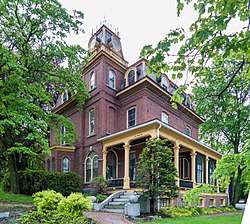Frank L. Dingley House
The Frank L. Dingley House is an historic house at 291 Court Street in Auburn, Maine, United States. Built in 1867, it is a high-quality local example of Second Empire architecture. It is most significant as the long-time home of Frank L. Dingley, long-time editor of the Lewiston Evening Journal, the state's second-largest newspaper at the time. The house was listed on the National Register of Historic Places in 1980.[1]
Frank L. Dingley House | |
 Frank L. Dingley House | |
  | |
| Location | 291 Court Street, Auburn, Maine |
|---|---|
| Coordinates | 44°5′53″N 70°13′58″W |
| Built | 1867 |
| Architectural style | Second Empire, Other |
| NRHP reference No. | 80000211[1] |
| Added to NRHP | April 23, 1980 |
Description and history
The Dingley House is set on the north side of Court Street, in a residential area just west of Auburn's downtown area. It is a nominally 2-1/2 story brick structure, with a mansard roof providing a full third floor. The roof is slate, pierced by two brick chimneys, and there is a mansard-topped tower on the street-facing facade. The main facade, however is oriented toward the east, looking down the hill over Auburn and Lewiston. A single-story porch extends along this facade, with decorative denticulated cornice and wooden posts.[2]
The house was built in 1867 for Frank Dingley, and was his home until his death in 1918. A graduate of Bowdoin College, Dingley was for 57 years chief editor of the Lewiston Evening Journal, which he and his brother converted to a daily newspaper when they acquired it in 1861. Dingley was innovative in the early adoption of the telegraph for transmission of news reports, and oversaw a great expansion of the newspaper's facilities in 1898. He was a local patron of the arts, and supported the efforts of F. E. Stanley to produce the Stanley Steamer automobile.[2]
References
- "National Register Information System". National Register of Historic Places. National Park Service. January 23, 2007.
- "NRHP nomination for Frank L. Dingley House". National Park Service. Retrieved 2015-07-15.